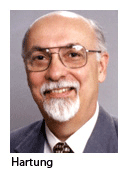With Dr. Bruce Hartung
Reader: Thanks for “cracking open the door” on congregational response of both hurt and loss to pastoral departure in your “Pressure Points” column. [For the July column, visit http://classic.lcms.org/?18896.] …. Especially of concern to those of us who lead and promote the Intentional Interim Ministry process/approach would be a recognition not only of the grief work needed, but … the specific opportunity such a kairos provides for new directions, identity and leadership.
Every crisis is a spiritual opportunity.
Hartung: Indeed, it is a spiritual opportunity.
One of the best resources I know that specifically addresses the tasks involved is Loren Mead’s A Change of Pastors, a publication of the Alban Institute (www.alban.org). This book is must reading for anyone in congregational leade rship when there is a pastoral change.
rship when there is a pastoral change.
In Mead’s words, “When the congregation went through a change of the leading clergy-person, there was an extraordinary pregnant moment at which change could happen. We learned that that was when change would happen, powerfully, no matter what — and that change could go either toward health or toward dysfunction” (Page X, Introduction).
Mead identifies both tasks and processes that need to happen during this period of time. These processes include 1) “coming to terms with the congregation’s history”; 2) “discovering a new identity, a new sense of mission”; 3) “helping the congregation’s internal leadership to grow and change”; 4) “rediscovering linkages to the denomination”; and 5) “establishing a new commitment between people and the new pastor in their mission together” (Page 18).
While not every congregation should use or can benefit from an intentional interim pastor, these processes — which are relatively straightforward — need to be addressed to take advantage of the opportunity.
One of the Synod’s intentional interim pastors notes the following: “The goal of interim ministry is to use wisely the time between pastors to foster a congregational climate and culture that supports and is congruent with the church’s God-given mission. Such a climate is less encumbered by the weight of the past or ‘stuck’ with unmanaged anxiety about the future. Transition times are crises/opportunities — both reparative and preparative. Members of healthy congregations are growing in knowledge about who they are, where they are going and why they are here. They are ‘ready for the adventure’ of the next chapter of ministry.”
Not everyone in every parish sees this as an opportunity for the processes identified above.
Reader: Our interim pastor (who has been trained in interim ministry) is doing a wonderful job, but many people in the congregation wonder why we aren’t calling a new pastor yet. … I see the long-term benefits for working through the process … but others are impatient. I’d love to hear your thoughts on dealing with the impatience.
Hartung: Processes like Mead describes take time to work through. Good congregational leadership will help people see the advantage in taking the time to do the necessary work.
But I think the anxiety or intensity to get the issue settled by quickly calling a new pastor also needs to be heard. Parish members do need the opportunity to give voice to their underlying concerns. The opportunity here is to create a forum, either individually or in a group, where members can surface their concerns and leaders can understand them. In short, you do not want to attack the impatience or pathologize it.
Understanding a concern, though, does not automatically mean agreeing with it. If your parish leaders and intentional interim pastor are working at what needs to get worked at, then the course needs to be stayed. And I’d recommend that everyone in leadership get a copy of Mead’s book and read it, if they have not already. This will help with the issues you raise.
Judging from the amount of response the July column received, we will be at this for another month or so, at least.
Rev. Bruce M. Hartung, Ph.D., is an associate professor and director of the M.Div./Alternate Route programs at Concordia Seminary, St. Louis. He can be reached at hartungb@csl.edu.
Posted July 29, 2011




